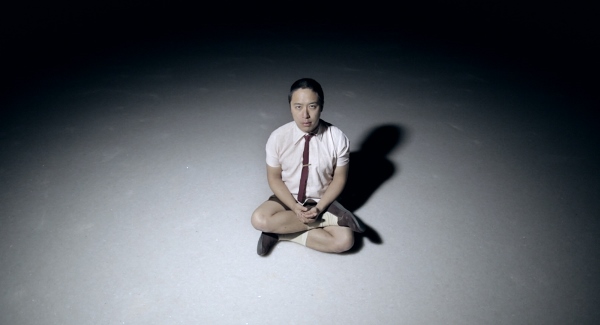Alvin's Harmonious World of Opposites premiered at Perth's Revelation Film Festival last year before going on to screen at the Sydney Underground Film Festival.
The first film from Australian filmmaker Platon Theodoris, it made its Stateside debut in January at Park City's Slamdance Festival.
"I was worried that the humour wouldn't translate [in America]", the director said, "but they loved it".
Theodoris was particularly nervous after a screening in Jakarta had gone down like a lead balloon.
"It's an informal Indonesian-Australian co-production, because part of the film was shot in Indonesia and one of the main actors is Indonesian, so we'd screened it at an arthouse cinema called Kino Forum in Jakarta, and it was unfortunate because even though we had really good subtitles, it didn't quite translate".
The film will screen later this month at ACMI, and at Sydney's Golden Age Cinema and Parramatta's Riverside Theatre in April.
Theodoris did an Arts degree at UNSW before becoming interested in filmmaking when he was on an exchange at the Jakarta Institute of Arts.
After university he made music videos, then moved on to TV commercials.
He's also made three shorts: Parasol, Lakemba (screened at Dendy Newtown in Sydney and Hoyts) and Sunrise.
Now he's made a feature, and the reviews have been unanimous in their praise for the film's idiosyncratic vision.
Alvin stars Sydney-based artists Teik-Kim Pok and Vashti Hughes, as well as Indonesian gospel-queen Dessy Fitri.
It was shot in Sydney, Kalgoorlie and Jakarta, and is about a man who's been holed up in his apartment for eighteen months.
I ask Theodoris where he thinks he sits in the Australian film landscape.
"To be honest with you, after the response in the States, I'm looking for opportunities there. The reality is that no-one in Australia, no-one in the government bureaucratic system, gives a shit about filmmakers like me and the other independents out there at the moment".
"I'm speaking about people like Joseph [Sims-Dennett], Megan [Riakos], Jonnie [Leahy], the guys from The Tail Job".
"There are all these independent filmmakers [out there], but there's a real institutionalized system of exclusion, where filmmakers who have a body of work – I've been a professional director for almost twenty years – can't access what's going on at Screen NSW or Screen Australia, because I don't tick any of their criteria".
"I've had shorts screen at many festivals, including London BFI, Busan, Singapore, Vancouver – and they're not festivals, apparently, that are good enough for Screen Australia. And when you don't have a high-name producer attached, you're not going to get yourself in the door".
So what about enlisting a producer for your next film?
"Well, absolutely, but I contacted a lot of producers before [Alvin], and the reality is that 96 percent of the producers never got back to me".
"The four [percent] that did were kind enough to give me some advice, and that advice was: you're going to struggle (laughs). And we can't help you. Go off and make it on your own, because what you're trying to do now is too ambitious, and unfortunately if you're too ambitious here you get slapped in the face. Whether producers will come knocking now I'm not sure".
"Dealing with that [bureaucracy] is so soul-destroying. It's probably just as bad as directing TV commercials [laughs]."
Alvin was made with private sponsorship, but Theodoris is hoping to get studio backing next time out.
"After the screening at Slamdance I had a big US studio [approach] who were at the screening and were blown away by the film. I'm negotiating the development of something with them. So it's almost like, why bother with Australia?"
"Look at who receives the funding. Someone like Emile Sherman, whose films have made hundreds of millions of dollars, receives those $30,000 grants for development. Why isn't someone like him ploughing the profits of his films back into [development]…why is someone like that still relying on a Screen Australia model when he's in a different league?"
Post-Slamdance, he's now firmly on the radar of the screen agencies, the director said.
"It's unfortunate, though, that my film needs to get an American stamp of approval before such doors open and that although Slamdance is on at the same time and place as Sundance it's still not recognised as a 'legitimate' festival for film makers".
"It sounds like I'm a bitter filmmaker, but if you're asking me where I sit as an Australian filmmaker, I'm just making films, I'm not trying to tick boxes".



